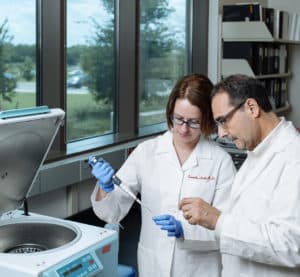
Health Starts With Science
Since its founding, Texas Biomed has gained worldwide recognition in scientific and academic communities for the quality of its basic research. On average, a new infectious disease has emerged every year for the past 30years. COVID-19 proved just how threatening these diseases can be, and researchers proved science is our best weapon. We are the is the only independent, nonprofit, infectious disease research institute in the US with an 80-year history of discovery-based science and an entrepreneurial culture that facilitates science worldwide
By the year 2050, infectious diseases are projected to become the leading cause of death. Texas Biomed is the ONLY private, non-profit infectious disease research facility to combine:
- 7 biocontainment laboratories, including 2 CDC regulated labs with the capacity to studydiseases from A to Z
- •1 of 7 ethically-operated National Primate Research Centers
- Decades of experience in regulated science required for FDA-approval of drugs and vaccines.
- An entrepreneurial culture that propels discoveries from the lab through FDA-approval faster, safer and with unrivaled excellence.
- A history of success to include work on the first COVID-19 vaccine, the firstEbola treatment, the first Hepatitis-C therapy and thousands of developmentaldiscoveries.
- Texas Biomed is combining the power and innovation of discovery-based science with the speed and efficiency of a contract research division to pioneer a new approach to research that is accelerating the development of diagnostics, therapies and vaccines.
The Texas Biomedical Research Institute began as the scientific dream of its founder, Thomas Baker Slick Jr. A businessman, inventor, oilman, rancher, engineer, philanthropist, peacemaker and adventurer, Tom Slick might best be described as a visionary. Motivated by the philosophy that the welfare of mankind could best be advanced through scientific endeavor, he dared to imagine a “city of science” in South Texas that could be a “great center for human progress through scientific research.”
Although at the time many people believed his grand ideas were impractical, he succeeded in establishing three premier scientific research organizations that continue to carry out his vision: Texas Biomedical Research Institute, Southwest Research Institute, and the Mind Science Foundation.
Texas Biomed is home to the nation’s only privately owned biosafety level four (BSL-4) maximum containment laboratory and operates 7,500 sq. ft. of biosafety level 3 laboratories for the facilitation of studies in tuberculosis,Ebola virus, Marburg virus, coronaviruses and more. The Southwest National Primate Research Center (SNPRC) provides broad services in primate research with specialized technologies, capabilities and primate resources, many of which are unique to the SNPRC. As one of the world’s leading independent biomedical research institutions, Texas Biomed is dedicated to the advancement of human health through basic and translational research into the nature, causes, prevention and eradication of infectious disease. Our partnerships continue to expand worldwide to deliver new diagnostics, treatments and cures through our preclinical research and development programs
.
-
Campus
Campus
Located on a 200-acre campus on the northwest side of San Antonio, Texas, Texas Biomed partners with hundreds of researchers and institutions around the world, targeting advances in the fight against infectious diseases impacting our communities around the world, including AIDS, TB, hepatitis, malaria, hemorrhagic fever viruses, parasitic infections and many other infectious diseases. We also study co-morbidities of infection and vulnerable populations, such as the very young and the elderly and those suffering from cardiovascular diseases and metabolic disorders.
-
Staff
Staff
Workforce Competency, Graduate Training and Career Development programs focus on providing skill-building opportunities for undergraduate, graduate and postdoctoral trainees looking to enter the field of bioscience and research, enhancing the talent of our future global workforce
Our staff of more than 360 employees includes a multidisciplinary team of approximately 65+ doctoral-level scientists who lead more than 200 major research projects in the Institute’s three program areas of Disease Intervention & Prevention, Host Pathogen Interactions and Population Health, as well as the Southwest National Primate Research Center.
View Institutional Leadership
-
Institutional Committees
Institutional Biosafety Committee
Our Institutional Biosafety Committee meetings are held the 3rd Thursday of every month at 9 a.m. and are open to the public. Please contact biosafety at 210-258-9864 for more information about the meetings.
To make your visit easier, please contact Biosafety ahead of time if you plan to attend a meeting. All visitors must be escorted on the Texas Biomed campus.
Institutional Animal Care and Use Committee
The responsibility of the Institutional Animal Care and Use Committee (IACUC) is to oversee the provisions for the care and well-being of animals used for research, teaching, and testing at Texas Biomed. The IACUC is also committed to serving the community by ensuring conformance to all legal and ethical standards regarding the use of animals in research In addition, the IACUC is engaged in assisting animal research investigators with their animal-related needs.
Our IACUC ensures the care and use of animals on campus is ethical humane by:
providing the initial and ongoing review and approval of all activities involving animals.
conduct semiannual inspections of all areas where animals are housed or undergo procedures.
conduct semiannual reviews of the overall institutional program of animal care.
continuously oversee and evaluate all aspects of the animal care program using federal and state regulations, veterinary standards of care, Institute polices, and standard operating procedures.